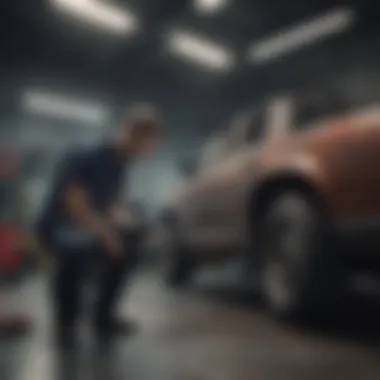Identifying the Right Body Shop for Cars Near You


Intro
Selecting the appropriate body shop for vehicle repairs can feel overwhelming. Cars are significant investments, and proper maintenance is crucial to their longevity. This article aims to guide readers through the process of identifying the right body shop in their area. From understanding the types of services available to recognizing the importance of certifications, we will provide insights on how to make informed choices. Key considerations and detailed questions to ask potential body shops will also be highlighted to ensure clarity in the decision-making process.
Coverage Options
When assessing body shops, it's important to be aware of the types of coverage options available for vehicle repairs. Proper coverage can safeguard you from unexpected expenses and enhance the quality of repair work.
Types of Coverage Available
Several coverage types can influence your choice of body shop. These may include:
- Comprehensive Coverage: Covers a range of damages, not limited to collision.
- Collision Coverage: Specifically handles damages resulting from accidents.
- Liability Coverage: Provides support if you are deemed at fault in an accident.
Understanding which type of coverage you have can guide your interactions with various repair shops.
Liability Coverage Explained
Liability coverage is vital as it protects you against claims made by others for damages or injuries. If you cause an accident, this coverage can help pay for repairs needed for the other person's vehicle. Knowing if your insurance covers body shop services can directly affect where you choose to take your car.
Key Considerations
Choosing a body shop involves more than just picking one that is nearby. Several essential factors should be in mind to ensure a satisfactory experience.
Factors to Assess When Choosing a Body Shop
- Reputation: Research customer reviews and ratings carefully. Good feedback often points to reliable services.
- Certifications: Confirm that the shop has appropriate certifications such as I-CAR or ASE. These validate their expertise.
- Estimates: Obtain detailed estimates from multiple shops to compare prices and services.
Understanding Policy Limits
It’s crucial to recognize the limits of your auto insurance policy. This includes:
- Deductibles: Know how much you must pay before coverage kicks in.
- Coverage Limits: Understand the maximum amount your policy will pay for repairs.
Being informed about these limits can prevent surprises during the repair process.
Informed decisions regarding body shop services lead to better outcomes for vehicle repairs.
In summary, knowing how to identify the right body shop involves understanding the coverage options, assessing key factors, and asking the right questions. This will allow vehicle owners to feel secure in their choices and ensure their cars receive quality care.
Understanding Body Shops for Cars
Understanding body shops for cars is essential for vehicle owners. Body shops play a key role in maintaining and restoring the appearance and functionality of vehicles. Selecting the right body shop means knowing the types of services they offer, their purpose, and how they can specifically cater to the needs of individual vehicles.
Definition and Purpose
A body shop is a facility that specializes in collision repair, paint restoration, and structural repairs among other vehicle services. The primary purpose of a body shop is to restore vehicles to their original condition following accidents or damage. This helps in preserving the vehicle's value and ensuring safety for drivers and passengers. The understanding of what a body shop does can aid vehicle owners in making informed choices that affect both the performance and the aesthetics of their cars.
Types of Services Offered
Body shops offer several services tailored to vehicle needs. These services are crucial in ensuring that cars not only look good but are also functioning as intended.
Collision Repair
Collision repair addresses the damages caused by accidents. It involves fixing body panels, aligning frames, and replacing damaged components. The key characteristic of collision repair is its focus on restoring safety and functionality. This makes it a popular choice for drivers involved in accidents. A unique feature is the technological advancements used in this repair process, which often includes computerized frame measuring systems. The advantage of this service is that it assures vehicle owners their repairs meet manufacturer specifications, ensuring safety on roads.
Paint Restoration
Paint restoration involves refining the vehicle’s paintwork after wear and tear or damage. Techniques can include polishing, buffing, or complete repainting. The key characteristic here is the attention to detail in matching paint colors and textures. This service is beneficial as it helps in enhancing the car's appearance, which can significantly impact resale value. However, one disadvantage is that the quality of paint and the expertise of the technicians can vary widely across different shops, leading to inconsistent outcomes.
Structural Repair


Structural repair focuses on restoring the integrity of a vehicle's frame or body. It is especially relevant for cars that have suffered serious impacts. The characteristic of this service revolves around ensuring the vehicle is safe to drive and compliant with safety standards. This service can be seen as beneficial due to its role in protecting occupants during future collisions. However, a potential disadvantage is the costs involved, as structural repairs can be quite extensive and are not suitable for all damage types.
Glass Replacement
Glass replacement includes the installation of new windshields and windows. This service is important for ensuring visibility and safety while driving. The key characteristic of glass replacement is the use of OEM parts or high-quality alternatives that meet safety standards. It is a beneficial service as damaged glass can severely impair driver visibility, leading to unsafe driving conditions. Although this service typically has quick turnaround times, one consideration is the potential for improper installation, which can lead to leaking and further issues.
Criteria for Selecting a Body Shop
Selecting the right body shop is a critical process for any vehicle owner. It ensures that the repairs will meet safety and aesthetic standards. The criteria for selecting a body shop encompass various aspects, which can greatly influence the quality and efficiency of service. Engaging with these criteria helps vehicle owners make informed choices, leading to better repair outcomes, improved vehicle longevity, and enhanced peace of mind.
Proximity and Accessibility
The location of a body shop holds significant importance. Choosing a body shop that is close to home or work makes it easier to drop off or pick up the vehicle. This accessibility can save time and costs associated with traveling further. Additionally, local shops often foster a strong community connection, which may lead to more personalized service. It is also advisable to examine the shop's operating hours. A body shop that aligns with your schedule increases convenience.
Range of Services
The variety of services offered by a body shop is another critical element to consider. A comprehensive service range allows owners to have multiple repairs done in one visit, streamlining the process. Essential services to look for include:
- Collision repair
- Paint restoration
- Structural repair
- Glass replacement
While specialty services may not be required by every vehicle owner, knowing they are available broadens choices when facing specific issues. A body shop that provides a diverse selection is often better equipped to handle various repair scenarios.
Work Quality and Attention to Detail
The quality of work performed by the body shop cannot be underestimated. To ensure the repair is up to standard, one must research previous work results. Look for shops that maintain a high level of craftsmanship, as this can reflect their overall commitment to quality. Asking for referrals or viewing before-and-after shots can provide insights into their capabilities. Paying attention to the small details during repairs can lead to better overall outcomes, reducing the likelihood of future issues. Ultimately, a body shop that emphasizes quality will not only restore the vehicle but also enhance its value over time.
"Selecting a body shop with careful consideration can transform a stressful repair process into a seamless experience."
The criteria discussed foster a more informed decision-making process, vital for ensuring both quality repairs and vehicle longevity. Always weigh the importance of these elements to make thoughtful selections.
Certifications and Qualifications
Certifications and qualifications of a body shop play a crucial role in determining the quality of service they offer. Understanding these credentials can help you identify a reliable and competent shop for your vehicle's needs. The presence of relevant certifications indicates a commitment to industry standards, safety protocols, and advanced techniques. This article section aims to inform you on the importance of certifications, as well as the specific accreditations that distinguish reputable body shops.
Importance of Certifications
Certifications mark a significant benchmark in the auto repair industry. When a body shop holds certain certifications, it means they have met the professional criteria set by recognized organizations. This denotes that the technicians are well-trained and have undergone rigorous evaluations. Choosing a certified body shop can lead to higher assurance of quality in repairs. The benefits include:
- Expertise: Certified technicians possess advanced skills and knowledge.
- Trust: Certifications build trust between customers and service providers.
- Warranty Protection: Many certifications ensure that repairs comply with manufacturer specifications, which can help maintain vehicle warranties.
In short, certifications are invaluable for guaranteeing the work is performed to high standards, making the selection of a certified body shop an informed choice.
Common Certifications to Look For
When assessing a body shop, it is vital to be aware of the certifications they hold. Here are some of the most recognized certifications in the industry:
ASE Certification
ASE Certification stands for Automotive Service Excellence. This certification targets mechanics and technicians and focuses on enhancing the skills required for effective vehicle repairs. One key characteristic of ASE Certification is its standardized testing system. Mechanics must pass written exams and gain practical experience to obtain it, demonstrating their capabilities in various automotive domains.
The unique feature of ASE Certification is its broad applicability across the entire automotive service field, making it a popular choice among shops that wish to showcase their staff's qualifications. The advantages include improved customer confidence and higher chances of delivering excellent service. However, this certification may not cover specialized areas, which is a consideration for some vehicle owners looking for niche repairs.
I-CAR Training
I-CAR, which stands for Inter-Industry Conference on Auto Collision Repair, provides education and training for collision repair professionals. This training centers on the latest technologies and repair techniques in the automotive repair industry. The key characteristic of I-CAR training is its focus on contemporary repair solutions and safety critical practices.
The unique aspect of I-CAR is its ongoing training programs, which help technicians stay updated with industry advances. This is beneficial for vehicle owners who want the most current practices applied to their repairs. However, the cost associated with frequent training updates might deter smaller shops from keeping all their staff I-CAR certified.
OEM Certifications
OEM Certifications are granted by Original Equipment Manufacturers and indicate that a body shop has the specific qualifications to repair vehicles according to manufacturer standards. The key characteristic of these certifications is their specificity, as they are tailored to particular brands of vehicles.


The unique feature of OEM certifications is the assurance that repairs are performed with original parts and follow manufacturer procedures. This is advantageous for those who want to maintain the integrity of their vehicle's warranty or value. A potential disadvantage is that not all body shops have access to or can afford the special tools and parts needed, which might limit options for some car owners.
Overall, understanding the certifications and qualifications of body shops equips you with the knowledge to make informed decisions about where to take your vehicle for repairs.
Investigating Reputation and Reviews
Investigating the reputation and reviews of a body shop is a critical step in the process of selecting the right facility for your vehicle's repair needs. This part of the decision-making process provides insight into the shop's reliability, quality of service, and customer satisfaction. Potential customers benefit from examining both online and offline sources of information to create a well-rounded view of what to expect.
The evaluation of a body shop's reputation hinges on transparency in feedback from previous clients. This helps to identify patterns in service quality and reliability. Strong reputations often signal a history of satisfied customers, while negative reviews may indicate persistent issues that warrant further scrutiny. As such, thorough research can save vehicle owners from regrettable choices later on.
Online Reviews and Ratings
Online reviews provide an immediate window into customer experiences with a body shop. Websites like Yelp, Google Reviews, and Facebook often serve as platforms where past clients share their thoughts about the services received. An abundance of positive reviews can suggest a trustworthy facility.
When exploring reviews, it is important to consider:
- The overall star rating of the shop.
- The number of reviews provided.
- Common themes in both positive and negative feedback.
While one-off complaints might not be deal-breakers, recurring criticisms around a specific service aspect could indicate more systemic problems.
"A large number of distinct reviews, particularly if they are current, typically reflect the shop's ongoing performance and reliability."
Word of Mouth Recommendations
Friends, family, and acquaintances often offer valuable insights into body shop experiences. Personal recommendations can be a powerful tool for finding a reputable shop. Someone's first-hand experience can provide clarity that online reviews may lack. When potential customers ask for recommendations, they gain access to insights based on real situations and trusted opinions.
Consider these factors when collecting recommendations:
- Direct experiences regarding service quality and outcomes.
- Insights into customer service interactions.
- The perceived value of the services provided.
In addition, asking specific questions such as "Did the repairs meet your expectations?" or "Was the shop timely in completing the work?" can lead to more informative conversations.
Evaluating Insurance Coverage and Costs
Understanding the role of insurance in vehicle repairs is crucial. Insurance coverage can significantly affect how much you spend on repairs and which body shops you may consider. When evaluating potential body shops, looking into the insurance aspect not only ensures you manage costs effectively but also allows you to work with shops that have experience with your insurance provider. This contributes to a smoother claims process, reducing stress during an already challenging time.
Understanding Insurance Options
Comprehensive Coverage
Comprehensive coverage pays for damages to your car that are not caused by a collision. This includes issues like theft, vandalism, or natural disasters. It is an essential choice for vehicle owners who seek peace of mind, knowing that any major non-collision damage is covered.
The key characteristic of comprehensive coverage is its wide range of protections. This insurance option is beneficial because it prevents substantial out-of-pocket expenses in case of unforeseen events. One unique feature is that it typically protects from events outside of your control, like hail damage or flood repairs.
That said, comprehensive coverage may come with a higher premium compared to more basic options. This may dissuade some vehicle owners, but the advantages often outweigh the costs. For those who want broad protection, this type of insurance remains popular and practical.
Liability Coverage
Liability coverage is another critical component of auto insurance. It covers damages you may cause to others in an accident, including bodily injury and property damage. This serves to protect the at-fault driver from potential lawsuits and claims from other parties.
The primary aspect of liability coverage is its necessity by law in many places, making it a fundamental choice for vehicle owners. It provides financial security in the event you are found responsible for an accident. This type of coverage can also be more affordable than comprehensive coverage.
However, liability coverage has a significant limitation; it does not cover damages to your own vehicle. This is an important consideration for those who prioritize comprehensive protection over just liability. While it fulfills legal requirements, understanding its scope is essential for informed decision-making.
Cost Evaluations and Estimates
Cost evaluations should be a transparent process. When you receive estimates from body shops, it's essential to know what each charge encompasses. Generally, estimates should include labor, parts, and any additional fees.
An effective method to compare these estimates is to ask body shops to break down their costs. This allows you to see where your money is going and help identify if any charges seem excessive. Understanding these evaluations can lead to better negotiations and potentially lower costs.
Additionally, be aware of the average pricing for services in your area. Using online resources or community recommendations can provide base figures for various types of repairs and help you gauge whether you are being offered a fair deal.


Ultimately, evaluating insurance coverage and costs will guide you in selecting the right body shop. It is not just about finding a shop; it's ensuring that the financial aspects are well understood and managed.
Questions to Ask Potential Body Shops
When considering a body shop for repairs, asking the right questions is crucial. It can reveal important details about the shop's qualities and operations that aren't obvious from the outside. Engaging in dialogue with potential shops helps assure that your expectations align with their services. Knowledgeable inquiries can also illuminate the depth of their expertise and customer care philosophy.
Inquiries about Services
Start by asking about the specific services offered. Not every body shop provides the same range of repairs. Ensure they specialize in the type of work your vehicle needs. For instance, some may excel in collision repairs, while others might be more focused on frame straightening or paint restoration. You can ask questions like:
- What specific types of repairs do you specialize in?
- Are there particular brands or models of vehicles you handle?
- Can you provide examples of similar repairs done in the past?
Furthermore, it's wise to know about the technology and tools they utilize. Advanced equipment may speed up the repair process and enhance quality. Make sure to inquire about the types of paint and parts they use, especially if you prefer original manufacturer parts.
Warranty and Guarantee Policies
Understanding the warranty and guarantee policies of a body shop is vital for your peace of mind. Reputable shops often offer assurances, signaling their confidence in the work performed. You should clarify:
- What type of warranty do you provide for your repairs?
- How long does the warranty last?
- Does the warranty cover all parts and labor or just specific areas?
These questions will help you assess the shop's commitment to quality. A longer warranty may indicate a higher level of craftsmanship and a willingness to stand behind their work. Also, inquire about what the warranty entails and any conditions that could void it. This information can be essential in protecting your investment.
"A good warranty shows that a body shop trusts its craft and is ready to support its work long after the repair is complete."
Evaluating these factors helps ensure that you select a body shop that will not only meet your immediate needs but also safeguard your interests in the future.
Additional Considerations
When identifying the right body shop for car repairs, additional considerations can play a critical role in the decision-making process. These factors often determine the level of service a body shop can provide and how well they align with your specific requirements. Evaluating the specialty services and environmental practices of a body shop is essential, as these aspects can significantly enhance the overall repair experience and the long-term value of your vehicle maintenance.
Specialty Services Available
Classic Car Restoration
Classic car restoration is a specialized service that focuses on bringing vintage vehicles back to their former glory. Enthusiasts often seek out body shops with expertise in this area due to the distinct craftsmanship involved. A key characteristic of classic car restoration is the attention to detail it requires. Restorers must use period-correct parts and techniques to maintain the authenticity of the vehicle. This service is beneficial because it preserves the vehicle's heritage and can enhance its value over time.
The unique feature of classic car restoration is the blend of technical skills and artistic sensibility. This attention to both historical accuracy and aesthetic appeal means that restorers can sometimes achieve results that make a car look better than new. However, it is worth noting that restoration can be a lengthy and costly process, which may not suit all vehicle owners. Choosing a body shop experienced in classic restoration can make a significant difference in the outcome, so doing thorough research is important.
Performance Modifications
Performance modifications involve upgrades to various aspects of a vehicle to enhance its speed, efficiency, and overall functionality. This service is particularly appealing to car enthusiasts seeking to maximize the performance of their vehicles beyond factory specifications. A key characteristic of performance modifications is the ability to tailor changes specifically to individual preferences, ranging from improved exhaust systems to enhanced brake performance.
One of the unique features of performance modifications is the variety of options available. Owners can choose from a spectrum of upgrades that fit their budget and objectives, whether for racing, daily driving, or aesthetic improvements. The advantages of these modifications include improved driving experience and potential increases in resale value. However, there can be disadvantages such as warranty voiding and insurance implications, which necessitate careful consideration before proceeding with modifications.
Environmental Practices
The environmental practices used by body shops are increasingly relevant in today's eco-conscious society. These practices not only reflect the shop's commitment to sustainability but also influence regulatory compliance and community relations. Body shops that prioritize eco-friendly techniques may use water-based paints and have waste disposal practices that minimize environmental impact.
Understanding a body shop's environmental practices can be beneficial for vehicle owners who are concerned about their carbon footprint. It signifies a dedication to responsible business operations and better alignment with consumer values. Furthermore, such shops often promote energy-efficient practices that can ultimately lead to cost savings in the long run. Therefore, in your search for the right body shop, take the time to inquire about their approaches to environmental sustainability.
The End
In this article, we have explored various essential aspects related to choosing the right body shop for your vehicle. Understanding the nuances of body shop operations is crucial for vehicle owners, whether you are a homeowner or a small business owner. The conclusion emphasizes how informed decisions can enhance your experience, ultimately saving time and money.
Summary of Key Points
Selecting an appropriate body shop requires careful consideration of multiple factors. Key points discussed include:
- Understanding Body Shops: An overview of services such as collision repair, paint restoration, and structural repair.
- Criteria for Selection: Importance of location, service range, and quality of work.
- Certifications: Recognizing the significance of industry certifications like ASE Certification and I-CAR Training.
- Reputation and Reviews: Utilizing online reviews and personal recommendations to gauge competence.
- Insurance and Costs: Understanding insurance coverage options and evaluating costs.
- Inquiries: Essential questions to ask potential body shops about their services and warranties.
- Specialty Services: Insights into unique services available, such as classic car restoration.
These points offer a comprehensive framework that guides vehicle owners in assessing body shops effectively.
Encouragement for Informed Decisions
It is crucial to advocate for well-informed choices. By equipping yourself with the right knowledge and resources, you can find a body shop that meets your specific needs. Consider taking the following steps:
- Conduct Thorough Research: Investigate body shops in your area; explore their services and past work.
- Ask for Recommendations: Speak to friends or family for their experiences and suggestions.
- Evaluate Certifications: Ensure that the body shop has the right credentials and follows industry standards.
- Trust Your Instincts: After gathering information, choose a shop that feels right for you, one that communicates effectively and shows attention to detail.
Ultimately, your decision can significantly affect the quality of repairs and the longevity of your vehicle. Be proactive and meticulous to ensure that your car receives optimal care.



